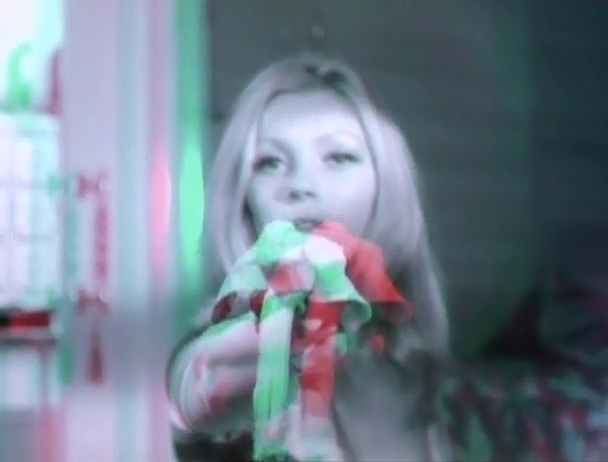School for Sex
Scrubbers from
the scrubs go to work for a gentleman of reduced means who’s learned it all
from his many thieving wives.
The girls are
innocent, done up by an acid-pedlar, for example,
“that swine”.
A drunken duchess
and the pugilist of former days who wants to be her paramour assist in the
training.
“Lovely lolly” is
the attraction for a probation officer named Clapp who supplies the girls to
Wingate Manor Finishing School, “exclusive”.
The village
squire, despoiled of millions, thus gets his own back.
Bishops and
viscounts and sheiks send their daughters. Police raid the joint as an “immoral
house”.
The judge knows a
good thing when he sees one.
Cool It, Carol!
A work of genius
on the rise to success and fame and fortune in London for a couple of kids down
the motorway.
Die Screaming Marianne
A superb
analytical masterpiece on a certain nexus or constellation, the crooked judge,
the go-go girl, the half-sister, the best man and so forth, on two planes at
once, Britain and Portugal.
Halliwell’s
Film Guide takes no notice of
Walker’s films, the director probably returns the
compliment.
Four Dimensions of Greta

“Is she—has she
been murdered?”
“I hope not.”
“You must be a real journalist,” Der Stein. Ruthless exploiter of foreign
girls in Notting Hill Gate is our Greta Gruber of
Deutschland, according to one account, she flicks her lengthy cigarette holder
at the 3D camera (cf. Val Guest’s Au Pair Girls)...
London nudes, a
case of back-alley double-parking. A further account
has her a charming exotic dancer shopped to the police by a proprietor’s lust (cf. Ken Hughes’ The Small World of Sammy Lee)...
“She was, er, an
au pair in Maida Vale.”
“Golders Green. Mrs. Marks.”
“Oh that’s right,
yeah. She was hard done by, so she quit. Then she was conned into stripping.” The
footballer and the masseuse at dinner (cf.
Tony Richardson’s Tom Jones), the
kiss from Arch Oboler’s Bwana Devil...
“I’m a Frankfurter Zeitung
man myself.” The gambling hell proprietor and the masseuse from Berlin, or how
the footballer broke his arm... The witness
sequestered on a houseboat, “this is just like a very cheap British sex movie.”
A romantic
slow-motion night-on-London-town montage gives the director dessert in the
face.

The Flesh and Blood Show
The theme is
constantly adumbrated from O’Neill, the Shakespeare cult, against the living
creation symbolized by the improvisational troupe’s dancing cavemen, condemned
revolutionary, the “witchcraft” scene, and the piece that opens their revue,
“Birth of an Idea”.
These points will
no doubt have been lost on critics, they are so subliminally made and seeming
against all logic, but that is a conscious part of Walker’s originality, to run
counter very simply to certain received ideas, cinematic and otherwise.
Frightmare
Mater has an
uncontrollable urge for the forbidden fruit, you see, and Pater
loves her so.
Walker’s Adam and
Eve no institution can quite remedy.
The premise is
partly set up from Capra’s Arsenic and Old Lace, a neat analysis.
Ferreri’s La Grande bouffe
is the interrupted spectacle.
Time Out Film
Guide, despite the plug, had no
grasp of it.
House Of Mortal Sin
A demented priest
goes to town on his parishioners, and even kills his own mother.
And there is no
end of it, he desires the girl as the credits close, she resembles the girl he
was forbidden thirty years ago.
And so, a greatly
analytical work of genius on the wolf in sheep’s clothing, whited
sepulchers and all that.
Naturally,
Bergman has all this very fine in Fanny and Alexander, followed by
Russell in Crimes of Passion.
Schizo
The double
structure is mirrored in the Hitchcock feint (Psycho, the delayed
honeymoon) that finally establishes Marnie as the basis for the film.
Time Out Film
Guide scarcely took note of this.
The Comeback
A recording
artist retires and marries, divorces and returns to
the studio.
There all manner
of vicissitudes attend him, some of which are worked out in House of the
Long Shadows.
The allusion to
Hitchcock’s Psycho was deprecated by Time Out Film Guide, all it
could determine from the complex composition.
Home Before Midnight
He writes lyrics,
a lucrative profession in a thriving industry. She is sweet and twenty, well
into their love affair he accidentally discovers she is not yet fifteen.
“There is a
notice of the mind and there is a notice of the heart. The first is nothing.
And the heart is cold.”
Glenville’s Term
of Trial has a measure of this, Donner’s Twinky
(Lola) another.
His sentence is
two years’ imprisonment.
House of the Long Shadows
The author’s travails, or Seven Keys to Bllyddpaetwr.
Biggers & Cohan ace the lot.
Out of his
obscurity emerges the artist, much put upon of course.
All fiction, but
there is a real key.
Time Out Film
Guide had no idea, which generally
seems to have been the case with English critics.